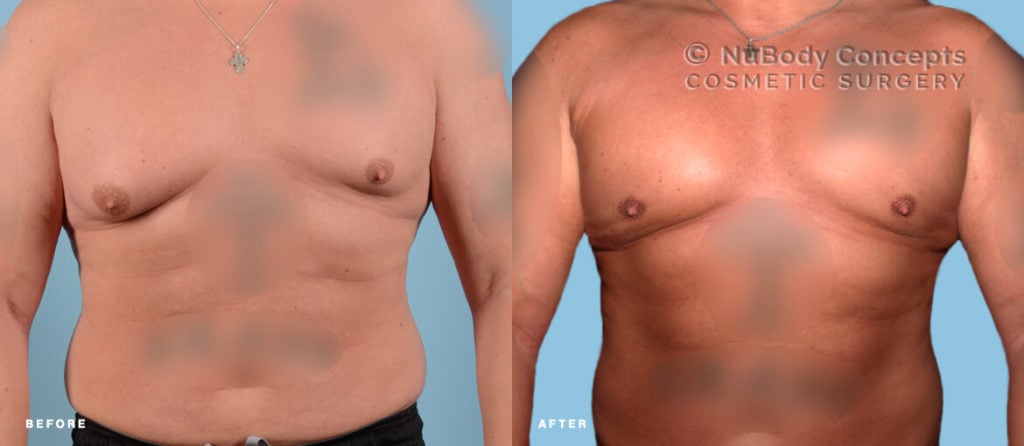
Medically reviewed by Dr. John Rosdeutscher – Written by Sine Thieme
Is Skin Tightening Safe?
It’s important to understand which procedure we are talking about before we discuss the safety of skin tightening, as many different treatments are lumped together under this terminology. The type of skin tightening discussed here is Radio Frequency Assisted Lipolysis, a minimally-invasive procedure that is typically combined with liposuction to achieve the best results. It is sold under the brand names BodyTite, FaceTite, and Renuvion. We are not talking about the risks and safety of non-invasive skin tightening.
Prior to your skin tightening procedure, you will be asked to sign an “informed consent document.” It details all known skin tightening complications, side effects, and risks. At NuBody Concepts Cosmetic Surgery in Nashville and Memphis, TN, we always perform BodyTite or Renuvion combined with liposuction, which means you will be signing consents for both procedures, even though their risk and safety profiles are very similar.
Anesthesia Risks
As mentioned before, RFAL skin tightening is minimally-invasive. This means that it does not require general anesthesia and that you are awake the entire time. The “wetting solution” that is used to prepare the treatment area under the skin contains a local anesthetic to numb the affected areas. A surgeon may recommend additional IV sedation for patients undergoing so-called “large volume” procedures where many and/or larger areas are treated. It is important to know that all anesthesia carries a certain risk; however, anesthesia complications after skin tightening and liposuction are rare.
Which anesthesia method is best for you is something you will discuss with your plastic surgeon during a personal consultation. At NuBody Concepts, we want to make sure you have the best possible experience. This means we can customize your anesthesia level to your personal preference and add IV Sedation upon request.
Bruising & Swelling
A certain amount of bruising and swelling can be expected after any liposuction or skin tightening procedure. This is a result of the surgeon passing a wand back and forth under your skin, which is bound to result in some trauma to the tissues, even if it is minimal. The bruising is typically kept in check by allowing a gently pulsating stream of water to break up fat cells under the skin. That also has the benefit of effecting a more even removal of fat with smoother end results.
Every patient can expect to experience some bruising and swelling after a skin tightening procedure, but the severity varies from patient to patient. You can expect it to subside after a few days, and cold compresses, elevation, and Ibuprofen can be used to alleviate any discomfort. Persistent swelling and/or chronic pain can occur in rare cases and is a reason to call your doctor. If you closely follow your cosmetic surgeon’s post-op instructions and wear the compression garment you’ve been given after the procedure, you can minimize any negative effects.
Change in Skin Sensation & Sensitivity
For any cosmetic procedure, it is fairly common to experience a loss of skin sensation in the affected areas, and skin tightening (with or without liposuction) is no exception. This is no cause for alarm as it typically resolves on its own. However, in rare cases the loss of sensation may persist.
On the other end of the spectrum, some patients may experience the opposite effect post-surgery: excessive itching, tenderness, or exaggerated responses to hot and cold temperatures. Again, this typically resolves during the healing process, but in rare cases it may require a doctor to look at it if it persists.
General Surgical Risks
Any surgery, including cosmetic surgery, can lead to complications. These complications include the risk of infection, accumulation of fluid, poor wound healing, the forming of blood clots, deep vein thrombosis, cardiac complications, pulmonary thromboembolisms or edema, and damage to deeper structures such as nerves, blood vessels, muscles, lungs and abdominal organs. All of these risks are rare and not specific to skin tightening or liposuction. Nevertheless, they will be listed in the informed consent document you’ll be asked to sign.
Thermal Burn or Heat Injury
This is the one risk truly attributable to liposuction/lipolysis techniques using targeted heat to shrink tissues. This includes ultrasound-assisted liposuction, laser liposuction, and radio frequency assisted lipolysis (RFAL) aka BodyTite and Renuvion. These technologies apply targeted heat to the tissues under the skin to contract and tighten the skin.
Anytime there is heat applied to tissues, there exists a risk of burning. However, due to the big strides made in the technologies over recent years, the risk of burns due to overheating has been greatly diminished. For instance, Renuvion applies bursts of helium plasma to generate a steady 65 – 85 degrees Celsius in under a second’s time. Such a short and precise application of energy protects the surrounding tissues and ensures that the heat is only applied where it is meant to.
Risks for Smokers
This is another risk that is not particular to skin tightening but true for any surgery, cosmetic or otherwise: Anyone who regularly smokes or has smoked in the past as well as people who use tobacco or nicotine products such as patches, gum, or nasal spray, (and to some extend even people exposed to secondary smoke) are at an increased risk of complications from surgery. These smoking-related risks include skin necrosis, delayed wound healing, and additional scarring. Smoking is also known to have a negative effect on the recovery from anesthesia.
If you do smoke, you can still improve your prognosis if you give it up at least six weeks before surgery. If you have smoked in the past, it is still something you will be asked to truthfully disclose in your signed consent document.
Undesirable Outcomes
Any cosmetic surgery can yield to less-than-satisfactory outcomes, for various reasons. The best way to avoid undesirable results from skin tightening is to have realistic expectations and to carefully listen to all options discussed during your consultation. Patients with outcomes less good than they hoped for may have avoided them by going with the recommended treatment instead of wishful thinking. If your plastic surgeon recommends a tummy tuck, for example, but you would prefer to have a less-invasive procedure without a scar, you will have to accept that your outcomes aren’t going to look the same.
Contour Irregularities
Skin tightening, especially when coupled with liposuction, can lead to contour irregularities in the treatment areas. This is not necessarily a risk factor as it does not affect your health. However, it may affect your results, which is something most patients would rather avoid. Uneven fat removal can result in skin that appears bumpy or wrinkly. A condition called fat necrosis, which hardens the skin, can also have this effect. Another effect of uneven fat removal is a pattern called “dog ears” that can appear in some cases at the ends of the small incisions. Lastly, any cellulite you had prior to surgery may appear to have worsened, or you may even develop new cellulite where you didn’t have it.
It should be said, however, that such irregularities caused by liposuction can actually be avoided by combining it with skin tightening. It contracts and smoothens the excess skin and thus improves irregularities you might otherwise have gotten from liposuction alone.
You should also know that most patients do not have entirely symmetric bodies. If your results turn out slightly asymmetrical, that is most likely the culprit and is no cause for alarm. However, a surgeon may attempt a revision procedure to improve any uneven contours.
Scarring
Neither skin tightening nor liposuction require the typical surgical incisions we associate with cosmetic surgery. They are instead delivered via a thin wand that is inserted under the skin through several strategically placed incisions. Even though some surgeons may place a stitch or two in more visible areas, like the neck, after the procedure, these small incisions do not tend to result in permanent scars. The temporary blemishes typically fade away over time.
However, it is important to note that each patient’s skin is different and thus heals differently. One patient’s incision marks may disappear a few weeks after the procedure, and another may need a few months or even up to a year. Either way, most patients do not have any complaints about skin tightening scars.
Minimizing Skin Tightening Risks
We hope that we have given you a good understanding about the safety of RFAL skin tightening and any potential side effects. It is worth remembering that severe complications from skin tightening are rare. RFAL procedures are both safe and effective, especially when they are performed by an experienced plastic surgeon. Choosing a board-certified plastic surgeon for your cosmetic procedure is an excellent way to ensure that he or she has the necessary expertise.
We’d like to stress one more time that by far the most important thing you can do to get good results from skin tightening is to diligently follow your doctor’s pre-op and post-op instructions. Make sure you go to all follow-up appointments to have your progress checked.
You can expect to see good results once the swelling and bruising have subsided, at 6 weeks at the latest. However, your results will continue to improve for up to a year post-op!
Check out our Skin Tightening Gallery for some examples.


Please don’t hesitate to contact us if you have any other questions about the safety and risks of non-surgical skin tightening. If you are ready to get started, use the pink button to schedule a consultation with our board-certified plastic surgeon in Nashville or Memphis.












